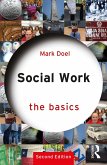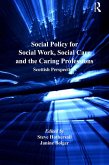Werner Schirmer, Dimitris Michailakis
Systems Theory for Social Work and the Helping Professions (eBook, PDF)
39,95 €
39,95 €
inkl. MwSt.
Sofort per Download lieferbar

20 °P sammeln
39,95 €
Als Download kaufen

39,95 €
inkl. MwSt.
Sofort per Download lieferbar

20 °P sammeln
Jetzt verschenken
Alle Infos zum eBook verschenken
39,95 €
inkl. MwSt.
Sofort per Download lieferbar
Alle Infos zum eBook verschenken

20 °P sammeln
Werner Schirmer, Dimitris Michailakis
Systems Theory for Social Work and the Helping Professions (eBook, PDF)
- Format: PDF
- Merkliste
- Auf die Merkliste
- Bewerten Bewerten
- Teilen
- Produkt teilen
- Produkterinnerung
- Produkterinnerung

Bitte loggen Sie sich zunächst in Ihr Kundenkonto ein oder registrieren Sie sich bei
bücher.de, um das eBook-Abo tolino select nutzen zu können.
Hier können Sie sich einloggen
Hier können Sie sich einloggen
Sie sind bereits eingeloggt. Klicken Sie auf 2. tolino select Abo, um fortzufahren.

Bitte loggen Sie sich zunächst in Ihr Kundenkonto ein oder registrieren Sie sich bei bücher.de, um das eBook-Abo tolino select nutzen zu können.
This book provides an easy to read introduction to systems thinking for social workers who will encounter social problems in their professional practice or academic research.
- Geräte: PC
- mit Kopierschutz
- eBook Hilfe
- Größe: 5.67MB
Andere Kunden interessierten sich auch für
![Systems Theory for Social Work and the Helping Professions (eBook, ePUB) Systems Theory for Social Work and the Helping Professions (eBook, ePUB)]() Werner SchirmerSystems Theory for Social Work and the Helping Professions (eBook, ePUB)39,95 €
Werner SchirmerSystems Theory for Social Work and the Helping Professions (eBook, ePUB)39,95 €![Social Policy for Social Work, Social Care and the Caring Professions (eBook, PDF) Social Policy for Social Work, Social Care and the Caring Professions (eBook, PDF)]() Social Policy for Social Work, Social Care and the Caring Professions (eBook, PDF)40,95 €
Social Policy for Social Work, Social Care and the Caring Professions (eBook, PDF)40,95 €![Social Work: The Basics (eBook, PDF) Social Work: The Basics (eBook, PDF)]() Mark DoelSocial Work: The Basics (eBook, PDF)18,95 €
Mark DoelSocial Work: The Basics (eBook, PDF)18,95 €![Social Work (eBook, PDF) Social Work (eBook, PDF)]() Social Work (eBook, PDF)34,95 €
Social Work (eBook, PDF)34,95 €![An Introduction to Social Work Theory (eBook, PDF) An Introduction to Social Work Theory (eBook, PDF)]() David HoweAn Introduction to Social Work Theory (eBook, PDF)33,95 €
David HoweAn Introduction to Social Work Theory (eBook, PDF)33,95 €![Social Policy for Social Work, Social Care and the Caring Professions (eBook, PDF) Social Policy for Social Work, Social Care and the Caring Professions (eBook, PDF)]() Janine BolgerSocial Policy for Social Work, Social Care and the Caring Professions (eBook, PDF)43,95 €
Janine BolgerSocial Policy for Social Work, Social Care and the Caring Professions (eBook, PDF)43,95 €![Social Work in Europe (eBook, PDF) Social Work in Europe (eBook, PDF)]() Social Work in Europe (eBook, PDF)54,95 €
Social Work in Europe (eBook, PDF)54,95 €-
-
-
This book provides an easy to read introduction to systems thinking for social workers who will encounter social problems in their professional practice or academic research.
Dieser Download kann aus rechtlichen Gründen nur mit Rechnungsadresse in A, B, BG, CY, CZ, D, DK, EW, E, FIN, F, GR, HR, H, IRL, I, LT, L, LR, M, NL, PL, P, R, S, SLO, SK ausgeliefert werden.
Produktdetails
- Produktdetails
- Verlag: Taylor & Francis eBooks
- Seitenzahl: 178
- Erscheinungstermin: 21. März 2019
- Englisch
- ISBN-13: 9780429666704
- Artikelnr.: 55886517
- Verlag: Taylor & Francis eBooks
- Seitenzahl: 178
- Erscheinungstermin: 21. März 2019
- Englisch
- ISBN-13: 9780429666704
- Artikelnr.: 55886517
- Herstellerkennzeichnung Die Herstellerinformationen sind derzeit nicht verfügbar.
Werner Schirmer, PhD, holds a docent title in sociology from Uppsala University. He has worked at several universities in Germany, Sweden, the USA, and Belgium. Currently, he is working at the department of Sociology at the Vrije Universiteit Brussel, research group TOR. Schirmer has written several articles and book chapters applying systems theoretical thinking to topics such as interethnic relations, social work and social problems, inclusion/exclusion, respect and tolerance, international relations, priority setting in healthcare, and loneliness among older people. His current research focuses on the impact of digital technologies on social relations.
Dimitris Michailakis, PhD, is Professor of Sociology and Chair Professor of Social Work. He is the author of several books and reports for national and international organisations. In his research, he mainly highlights two strongly correlated areas. The first area is political governance, with particular emphasis on how the welfare state has tried to control other social systems to become more responsive towards vulnerable groups. The second area is about modern society's strongest conflict, namely the one between a fundamental right to inclusion and a steadily increasing exclusion.
Dimitris Michailakis, PhD, is Professor of Sociology and Chair Professor of Social Work. He is the author of several books and reports for national and international organisations. In his research, he mainly highlights two strongly correlated areas. The first area is political governance, with particular emphasis on how the welfare state has tried to control other social systems to become more responsive towards vulnerable groups. The second area is about modern society's strongest conflict, namely the one between a fundamental right to inclusion and a steadily increasing exclusion.
Preface to the Swedish original
Preface to the international version
Introduction
Outline of the book
Chapter 1. Communication.
What people often mean by "communication"
The transmission model and its shortcomings
The complexity of communication
What is emergence?
Communication as system
Systems theory, communication and causality
Metacommunication and the five axioms of communication
Pathological communication: the practical relevance of systems theory
Chapter 2. System and environment.
Interaction systems
Organisation systems
Differentiation of different system levels: interaction, organisation and society
Chapter 3. Modern society and functional differentiation.
A short history of societal differentiation
Societal differentiation by the classics of social science
The differentiation of society according to systems theory
What does "functional differentiation" actually mean?
Function systems: some examples
The difference between function systems and organisation systems
Organisations and interactions in the context of function systems
Polyphonic organisations
Chapter 4. Society and the human being. On inclusion and exclusion.
The concept "person"
The human being in modern society: multi-inclusion
No inclusion without exclusion
Inclusion, exclusion and the role of organisations
Exclusion as a problem
Social work as exclusion management
Chapter 5. Constructionism and realism.
Functional differentiation: a short recap
Toward a constructionism so radical that it is realist at the same time
Systems as observers
Realism and constructionism: realities of the first and second orders
Causality from a systems-theoretical perspective I: circularity
Causality from a systems-theoretical perspective II: causality as construction
Application case: teachers in a "blackboard jungle"
Chapter 6. Systems theory and social problems.
Systems theory and social problems: realism
Systems theory and social problems: constructionism
Illustration: suicide among people with mental illness as a social problem
Illustration: loneliness among older people as a social problem
Chapter 7. Intervention and steering.
Expectations structure systems
Political steering
Steering optimism or steering pessimism?
Steering of organisation systems
Case study
Chapter 8. Functions and latent problems, systemic criticism, and social work as a reflection theory.
Systems theory and the functional method
Illustration: the latent function of the Ethical Platform in healthcare priority-setting
Social criticism with systems theory
Social work research as a reflection theory of the help system
Conclusion
References
Index
Preface to the international version
Introduction
Outline of the book
Chapter 1. Communication.
What people often mean by "communication"
The transmission model and its shortcomings
The complexity of communication
What is emergence?
Communication as system
Systems theory, communication and causality
Metacommunication and the five axioms of communication
Pathological communication: the practical relevance of systems theory
Chapter 2. System and environment.
Interaction systems
Organisation systems
Differentiation of different system levels: interaction, organisation and society
Chapter 3. Modern society and functional differentiation.
A short history of societal differentiation
Societal differentiation by the classics of social science
The differentiation of society according to systems theory
What does "functional differentiation" actually mean?
Function systems: some examples
The difference between function systems and organisation systems
Organisations and interactions in the context of function systems
Polyphonic organisations
Chapter 4. Society and the human being. On inclusion and exclusion.
The concept "person"
The human being in modern society: multi-inclusion
No inclusion without exclusion
Inclusion, exclusion and the role of organisations
Exclusion as a problem
Social work as exclusion management
Chapter 5. Constructionism and realism.
Functional differentiation: a short recap
Toward a constructionism so radical that it is realist at the same time
Systems as observers
Realism and constructionism: realities of the first and second orders
Causality from a systems-theoretical perspective I: circularity
Causality from a systems-theoretical perspective II: causality as construction
Application case: teachers in a "blackboard jungle"
Chapter 6. Systems theory and social problems.
Systems theory and social problems: realism
Systems theory and social problems: constructionism
Illustration: suicide among people with mental illness as a social problem
Illustration: loneliness among older people as a social problem
Chapter 7. Intervention and steering.
Expectations structure systems
Political steering
Steering optimism or steering pessimism?
Steering of organisation systems
Case study
Chapter 8. Functions and latent problems, systemic criticism, and social work as a reflection theory.
Systems theory and the functional method
Illustration: the latent function of the Ethical Platform in healthcare priority-setting
Social criticism with systems theory
Social work research as a reflection theory of the help system
Conclusion
References
Index
Preface to the Swedish original
Preface to the international version
Introduction
Outline of the book
Chapter 1. Communication.
What people often mean by "communication"
The transmission model and its shortcomings
The complexity of communication
What is emergence?
Communication as system
Systems theory, communication and causality
Metacommunication and the five axioms of communication
Pathological communication: the practical relevance of systems theory
Chapter 2. System and environment.
Interaction systems
Organisation systems
Differentiation of different system levels: interaction, organisation and society
Chapter 3. Modern society and functional differentiation.
A short history of societal differentiation
Societal differentiation by the classics of social science
The differentiation of society according to systems theory
What does "functional differentiation" actually mean?
Function systems: some examples
The difference between function systems and organisation systems
Organisations and interactions in the context of function systems
Polyphonic organisations
Chapter 4. Society and the human being. On inclusion and exclusion.
The concept "person"
The human being in modern society: multi-inclusion
No inclusion without exclusion
Inclusion, exclusion and the role of organisations
Exclusion as a problem
Social work as exclusion management
Chapter 5. Constructionism and realism.
Functional differentiation: a short recap
Toward a constructionism so radical that it is realist at the same time
Systems as observers
Realism and constructionism: realities of the first and second orders
Causality from a systems-theoretical perspective I: circularity
Causality from a systems-theoretical perspective II: causality as construction
Application case: teachers in a "blackboard jungle"
Chapter 6. Systems theory and social problems.
Systems theory and social problems: realism
Systems theory and social problems: constructionism
Illustration: suicide among people with mental illness as a social problem
Illustration: loneliness among older people as a social problem
Chapter 7. Intervention and steering.
Expectations structure systems
Political steering
Steering optimism or steering pessimism?
Steering of organisation systems
Case study
Chapter 8. Functions and latent problems, systemic criticism, and social work as a reflection theory.
Systems theory and the functional method
Illustration: the latent function of the Ethical Platform in healthcare priority-setting
Social criticism with systems theory
Social work research as a reflection theory of the help system
Conclusion
References
Index
Preface to the international version
Introduction
Outline of the book
Chapter 1. Communication.
What people often mean by "communication"
The transmission model and its shortcomings
The complexity of communication
What is emergence?
Communication as system
Systems theory, communication and causality
Metacommunication and the five axioms of communication
Pathological communication: the practical relevance of systems theory
Chapter 2. System and environment.
Interaction systems
Organisation systems
Differentiation of different system levels: interaction, organisation and society
Chapter 3. Modern society and functional differentiation.
A short history of societal differentiation
Societal differentiation by the classics of social science
The differentiation of society according to systems theory
What does "functional differentiation" actually mean?
Function systems: some examples
The difference between function systems and organisation systems
Organisations and interactions in the context of function systems
Polyphonic organisations
Chapter 4. Society and the human being. On inclusion and exclusion.
The concept "person"
The human being in modern society: multi-inclusion
No inclusion without exclusion
Inclusion, exclusion and the role of organisations
Exclusion as a problem
Social work as exclusion management
Chapter 5. Constructionism and realism.
Functional differentiation: a short recap
Toward a constructionism so radical that it is realist at the same time
Systems as observers
Realism and constructionism: realities of the first and second orders
Causality from a systems-theoretical perspective I: circularity
Causality from a systems-theoretical perspective II: causality as construction
Application case: teachers in a "blackboard jungle"
Chapter 6. Systems theory and social problems.
Systems theory and social problems: realism
Systems theory and social problems: constructionism
Illustration: suicide among people with mental illness as a social problem
Illustration: loneliness among older people as a social problem
Chapter 7. Intervention and steering.
Expectations structure systems
Political steering
Steering optimism or steering pessimism?
Steering of organisation systems
Case study
Chapter 8. Functions and latent problems, systemic criticism, and social work as a reflection theory.
Systems theory and the functional method
Illustration: the latent function of the Ethical Platform in healthcare priority-setting
Social criticism with systems theory
Social work research as a reflection theory of the help system
Conclusion
References
Index







